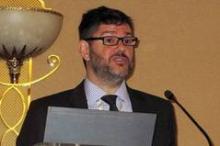MILAN – Denosumab, a drug originally developed to treat patients with osteoporosis, can halt progression of giant cell tumor of the bone and is now considered by some experts to be standard treatment for patients with tumors that cannot be surgically removed without causing significant morbidity.
The Food and Drug Administration added this indication to the labeling for denosumab (Xgeva) in June 2013, and current management recommendations from the National Comprehensive Cancer Network list denosumab treatment as an option for patients with unresectable giant cell tumor of the bone (GCTB).
But experience with denosumab for this indication is limited and of relatively short duration, and questions remain about its optimal use.
"Does treatment need to be lifelong, if so what is the optimal schedule, and what are the long-term sequelae?" Dr. David Thomas said at Sarcoma and GIST 2014, hosted by the European Society for Medical Oncology. "If surgical resection is an option that is absolutely the first option. This is not an antitumor drug. It contains the tumor’s progression, and it does that very well," said Dr. Thomas, head of the sarcoma genomics and genetics laboratory at Peter MacCallum Cancer Centre in Melbourne.
"It’s clearly a good idea for patients with GCTB, where you would have to do a mutilating operation" to remove the tumor. But you’d be crazy to use it for a GCTB of the proximal tibia that is curable by resection and curettage and packing with cement," said Dr. Robert S. Benjamin, professor and chairman of sarcoma medical oncology at University of Texas M.D. Anderson Cancer Center, Houston. About 90% of GCTB are resectable in a way that is acceptable to patients, he estimated during an interview.
"For the 10% for whom surgery is not a good option, denosumab is fantastic, and it’s being used, but most medical oncologists never see these patients" because GCTB is relatively rare, Dr. Benjamin said.
The largest reported experience with denosumab in patients with GCTB was an international, multicenter, open-label study with 282 patients and a 13-month median follow-up reported last year by Dr. Thomas and his associates (Lancet Onc. 2013;14:901-8). Although this experience provided evidence for the drug’s efficacy and reasonable safety for many patients, the documented experience remains relatively short for a drug that may need to be taken lifelong to keep the tumor in check. And many patients would start treatment relatively early in life because when GCTB occurs, it is often in adolescents or young adults.
"We really don’t know what will happen long term," Dr. Thomas cautioned in an interview.
The published experience also highlighted some potential adverse effects from denosumab that warrant close monitoring of patients. Three of the 281 patients (1%) available for the safety analysis developed osteonecrosis of the jaw; 15 patients (5%) developed hypocalcemia, although none were considered serious; 5 patients (2%) had a serious infection; and 3 patients (1%) had a new primary malignancy. In addition, women should not become pregnant while on denosumab. So far, follow-up produced no suggestion of an increased rate of malignant transformation of the GCTB, he said.
"Because you may need to treat for a lifetime, it’s a big decision to start treatment. But before we had this, we couldn’t have a discussion," of a treatment option when surgery wasn’t possible, he said. "I had a patient in 2004, before denosumab was available, with multiple, recurrent giant cell tumors that spread up his spine" and hence were inoperable and the patient died from the "enormous morbidity" the tumor caused. "Denosumab would have likely saved his life," Dr. Thomas said.
The denosumab study was sponsored by Amgen, maker of the drug. Dr. Thomas said that he has received consulting fees and research support from Amgen. Dr. Benjamin said that he has been a consultant to Johnson & Johnson, Merck, and Pfizer.
On Twitter @mitchelzoler



